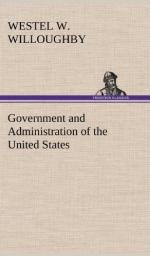All statesmen agree that a good government should possess ample power to interpret its own laws, and sufficient strength to fully enforce them. When we come, however, to the question of what are the proper subjects for control by government, and what for free management by individuals, we reach a subject upon which writers and thinkers have been unable to agree.
Under the great question, over how broad a field it is expedient and right to extend the activities of government, are embraced many of the great topics at present agitating the public mind. Difference upon this point has been one of the underlying causes of the existence of political parties in the United States, and has furnished one of the real springs of our history. Communism, socialism, and anarchy, may be embraced under this question. This it is that makes the study of the principles of government, especially in the United States, so important to every one who would understand the political life around him, and be able to form an intelligent decision upon the questions of the day. Shall the nation or the state own and manage the railroads, the telegraph lines, and the canals? Shall education receive the support of the state? Shall the employment of women and children in mines and factories be regulated by law? Shall the city own its own street railways, its markets, its water and gas supply, its telephones, and its water fronts? Shall this or that duty be delegated to the city or to the state, or shall it be left to the chance performance of individuals or corporations? These are some of the many questions of supreme importance that meet us at every point, and the better we understand the true nature and structure of our government, the better shall we be able to give intelligent answers.
Among the many functions of government, there are many so obviously necessary to the existence of a nation, however organized, that there is no discussion concerning the expediency of their exercise by the state. We may, therefore, group governmental duties under two heads: the necessary, and the optionable; or, as Professor Wilson has named them, the Constituent and the Ministrant.[1] Under the first head is embraced all those functions which must exist under every form of government; and under the second title those “undertaken, not by way of governing, but by way of advancing the general interests of society.” The following is Professor Wilson’s classification:
_#I. The Necessary or Constituent Functions.#_—
(1). The keeping of order and providing for the protection of persons and property from violence and robbery. (2). The fixing of the legal relations between man and wife, and between parents and children.
(3). The regulation
of the holding, transmission, and interchange
of property, and determination
of its liabilities for debt or for
crime.




